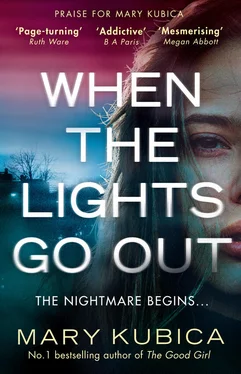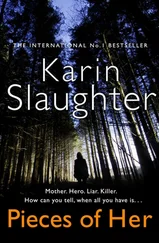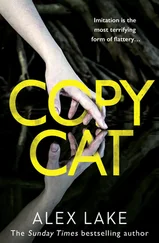“I can’t say for sure,” the nurse says. She repositions Mom on her right side, tucking a rolled-up blanket beneath her hip, checking the color of her hands and feet. “No one even knows for sure why we dream,” the nurse tells me, adding an extra blanket to my bed in case I catch a draft in my sleep. “Did you know that?” she asks, but I shake my head and tell her no. “Some people think that dreams serve no purpose,” she adds, winking. “But I think they do. They’re the mind’s way of coping, of thinking through a problem. Things we saw, felt, heard. What we’re worried about. What we want to achieve. You want to know what I think?” she asks, and without waiting for me to answer, she says, “I think your mom is getting ready to go in that dream of hers. Packing her bags and saying goodbye. Finding her purse and her keys.”
I can’t remember the last time I’d dreamed.
“It can take up to an hour to kick in , ” the nurse says, and this time I know she means the medicine.
The nurse catches me staring at Mom. “You can talk to her, you know?” she asks. “She can hear you,” she says, but it’s awkward then. Talking to Mom while the nurse is in the room. And anyway, I’m not convinced that Mom can really hear me, so I say to the nurse, “I know,” but to Mom, I say nothing. I’ll say all the things I need to say if we’re ever alone. The nurses play Mom’s records some of the time because, as they’ve told me, hearing is the last thing to go. The last of the senses to leave. And because they think it might put her at ease, as if the soulful voice of Gladys Knight & the Pips can penetrate the state of unconsciousness where she’s at, and become part of her dreams. The familiar sound of her music, those records I used to hate when I was a kid but now know I’ll spend the rest of my life listening to on repeat.
“This must be hard on you,” the nurse says, watching me as I stare mournfully at Mom, taking in the shape of her face, her eyes, for what might be the last time. Then she confesses, “I know what it’s like to lose someone you love.” I don’t ask the nurse who, but she tells me anyway, admitting to the little girl she lost nearly two decades ago. Her daughter, only three years old when she died. “We were on vacation,” she says. “My husband and me with our little girl.” He’s her ex-husband now because, as she tells me, their marriage died that day too, same day as their little girl. She tells me how there was nothing Madison loved more than playing in the sand, searching for seashells along the seashore. They’d taken her to the beach that summer. “My last good memories are of the three of us at the beach. I still see her sometimes when I close my eyes. Even after all these years. Bent at the waist in her purple swimsuit, digging fat fingers into the sand for seashells. Funny thing is that I have a hard time remembering her face, but clear as day I see the ruffles of that purple tulle skirt moving in the air.”
I don’t know what to say. I know I should say something, something empathetic. I should commiserate. But instead I ask, “How did she die?” because I can’t help myself. I want to know, and there’s a part of me convinced she wants me to ask.
“A hit-and-run,” she admits while dropping into an empty armchair in the corner of the room. Same one that I’ve spent the last few days in. She tells me how the girl wandered into the street when she and her husband weren’t paying attention. It was a four-lane road with a speed limit of just twenty-five as it twisted through the small seaside town. The driver rounded a bend at nearly twice that speed, not seeing the little girl before he hit her, before he fled.
“He,” she says then. “He.” And this time, she laughs, a jaded laugh. “I’ll never know one way or the other if the driver was male or female, but to me it’s always been he because for the life of me I can’t see a woman running her car into a child and then fleeing. It goes against our every instinct, to nurture, to protect,” she says.
“It’s so easy to blame someone else. My husband, the driver of the car. Even Madison herself. But the truth is that it was my fault. I was the one not paying attention. I was the one who let my little girl waddle off into the middle of the street.”
And then she shakes her head with the weariness of someone who’s replayed the same scene in her life for many years, trying to pinpoint the moment when it all went wrong. When Madison’s hand slipped from hers, when she fell from view.
I don’t mean for them to, but still, my eyes fill with tears as I picture her little girl in her purple swimsuit, lying in the middle of the road. One minute gathering seashells in the palm of a hand, and the next minute dead. It seems so tragic, so catastrophic, that my own tragedy somehow pales in comparison to hers. Suddenly cancer doesn’t seem so bad.
“I’m sorry,” I say. “I’m so sorry,” but she shoos me off and says no, that she’s the one who should be sorry. “I didn’t mean to make you sad,” she says, seeing my watery eyes. “Just wanted you to know that I can empathize. That I can relate. It’s never easy losing someone you love,” she says again, and then stands quickly from the armchair, gets back to tending to Mom. She tries to change the subject. “Feeling tired yet?” she asks again, and this time I tell her I don’t know. My body feels heavy. That’s as much as I knew. But heavy and tired are two different things.
She suggests then, “Why don’t I tell you a story while we wait? I tell stories to all my patients to help them sleep.”
Mom used to tell me stories. We’d lie together under the covers of my twin-size bed and she’d tell me about her childhood. Her upbringing. Her own mom and dad. But she told it like a fairy tale, like a once upon a time kind of story, and it wasn’t Mom’s story at all, but rather the story of a girl who grew up to marry a prince and become queen.
But then the prince left her. Except she always left that part out. I never knew if he did or if he didn’t, or if he was never there to begin with.
“I’m not your patient,” I remind the nurse but she says, “Close enough,” while dimming the overhead lights so that I can sleep. She sits down on the edge of my bed, pulling the blanket clear up to my neck with warm, competent hands so that for one second I envy Mom her care.
The nurse’s voice is low, her tone flat so she doesn’t wake Mom from her deathbed. Her story begins somewhere just outside of Moab, though it doesn’t go far.
Almost at once, my eyelids grow heavy; my body becomes numb. My mind fills with fog. I become weightless, sinking into the pitted hospital bed so that I become one with it, the bed and me. The nurse’s voice floats away, her words themselves defying gravity and levitating in the air, out of reach but somehow still there, filling my unconscious mind. I close my eyes.
It’s there, under the heavy weight of two thermal blankets and at the sound of the woman’s hypnotic voice, that I fall asleep. The last thing I remember is hearing about the snarling paths and the sandstone walls of someplace known as the Great Wall.
When I wake up in the morning, Mom is dead.
I slept right through it.
eden
May 16, 1996 Egg Harbor
Aaron showed me the house today. I’m in love with it already—a cornflower blue cottage perched on a forty-five-foot cliff that overlooks the bay. Pine floors and whitewashed walls. A screened-in porch. A long wooden staircase that leads down to the dock at the water’s edge where the Realtor promised majestic sunsets and fleets of sailboats floating by. Quaint , charming and serene . Those are the words the Realtor used. Aaron, as always, didn’t say much of anything, just stood on the balding lawn with his hands in the pockets of his jeans, staring out at the bay, thinking. He’s recently taken a job as a line cook at one of the restaurants in town, a chophouse in Ephraim. The cottage will more than cut his commute time in half. It’s also a steal compared to our current mortgage, and set on two acres of waterfront land that spans the heavily wooded backcountry to the rocky shores of Green Bay.
Читать дальше












